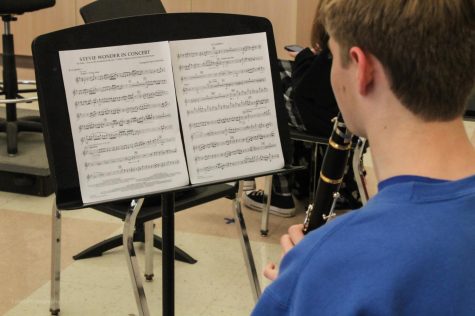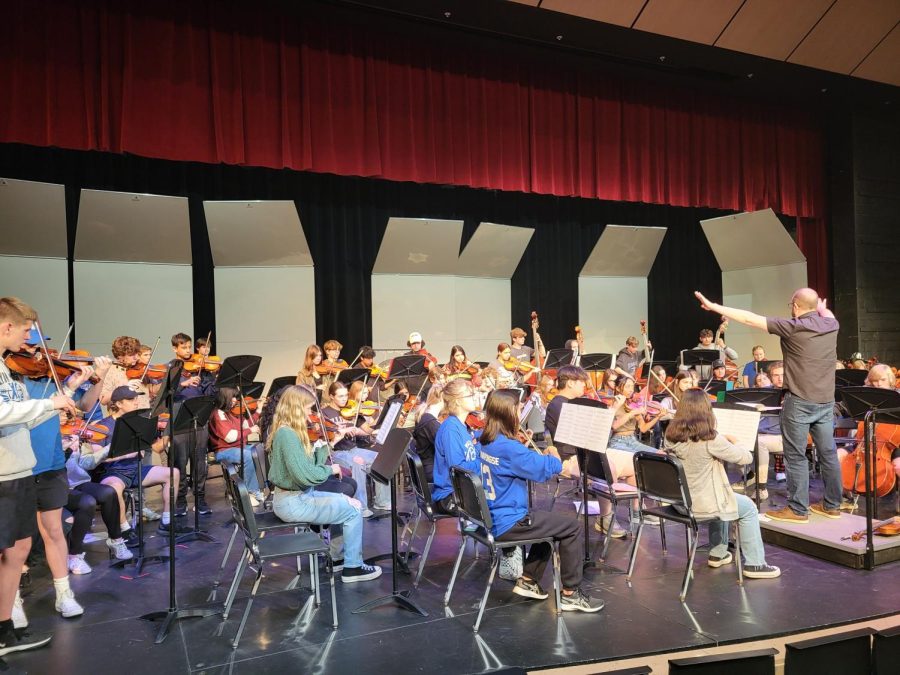Higher Level Music Classes Should Have Honors Weighting
Orchestra students practice at an after-school rehearsal.
May 12, 2023
Allow us to take you into the mind of a high school senior. When you are looking at your dream school, what do you think about when you consider your qualifications to go there? Most of the things that schools say they look for can be pretty abstract. They want future leaders, risk-takers, individuals who are socially-conscious. The one quantifiable statistic that you can look at is your GPA. It’s easy to get caught up in the 0.01 point difference that could allow you to stand out from the other college applicants. This is where it becomes very difficult for students pursuing higher-level music classes because it comes at the cost of our GPA. It becomes a choice between our interests and the most important number of our life (or it at least feels that way).
Between the two of us, we’ve been in all three branches of music, played more than eight instruments and participated in the highest ensembles at North. The North music program offers higher-level auditioned ensembles in orchestra, band, choir and jazz. These groups entail learning higher-level, often professional-level, repertoire as well as more performances. The musicians in these ensembles are the leaders of the music department, and they dedicate hours of their time to practicing. Despite the additional coursework, these classes aren’t given honors weight in students’ GPAs. They are simply weighed as standard-level courses. Basically, for the music students who value their academic standing, the fact that music classes are weighed disproportionately compared to the amount of effort put in is frankly insulting.

The auditions for these courses take place during the winter months of the previous school year with students spending hours practicing in order to place in one of the very limited seats. The amount of time and effort put into these auditions is easily comparable to the effort put into AP classes like biology and calculus. Stress also becomes a major factor due to the limited time frame and the even more limited availability. In most of these auditioned ensembles, there is only a certain number of seats available. For example, in Wind Ensemble, there are only two seats allotted for alto saxophones making these classes even more exclusive than regular honors classes in other subjects. Honors classes, Honors Biology or Honors Geometry for instance, are open to anyone, with no limitations on seats and no prerequisite.
We acknowledge that the process of changing a class weight is an incredibly long and difficult one. The GPA weight of classes is determined during a process called Curriculum, Assessment and Instruction (CAI) which is conducted by a team made up of teacher volunteers from those departments, building administrators and Learning and Teaching leadership representation. Once a class is adopted at the school level, there is no process to appeal for the weight of that course to be changed. However, music will eventually undergo CAI again. When this happens, we hope that the weight of the auditioned music ensembles will be reconsidered to better reflect the work that is put in by the students.
Being a part of D303 has always been associated with high expectations and high-achieving students. We can see it in the way that North has celebrated being named a Blue Ribbon School this past year, an award given due to high academic achievement by North students. The environment of the district simply pushes students to achieve more, do their best and be successful. We know that a number as trivial as our GPA won’t matter in 20 years– it probably won’t even matter two weeks from now as we are graduating seniors. But being a part of D303 sets the expectation that we should care about that number, and the lack of honors weight for the auditioned music classes forces a hard decision on students. We cannot ask for any immediate action, but we can call for the conversation to continue. Music students should continue to demand what they deserve, and the conversation should persist in future CAI processes for the music department.






